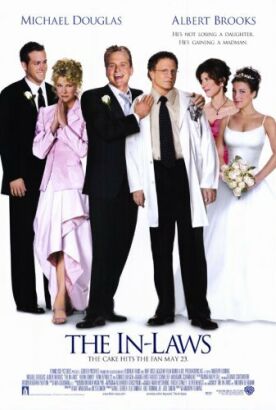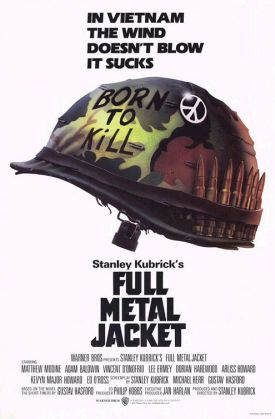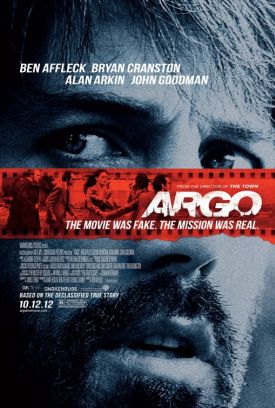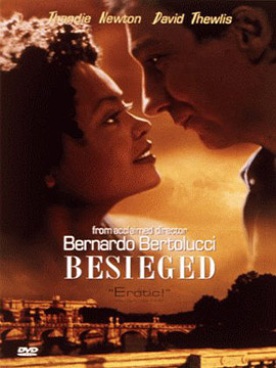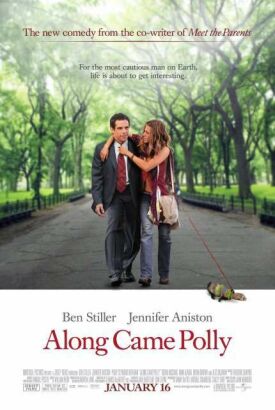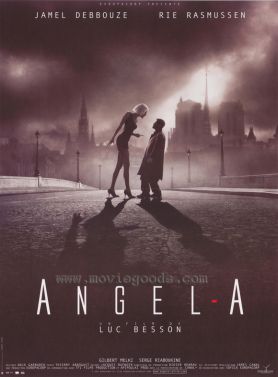In-Laws, The
The best joke in The In-Laws, a remake by Andrew Fleming of a 1979 film starring Peter Falk and Alan Arkin, comes as a gang of FBI agents barge into the home of Dr Jerry Peyser (Albert Brooks) in search of, well, something. The McGuffin. It doesn’t matter. Jerry, a fussy, timid podiatrist with a fear of flying has been drugged, kidnapped and whisked off to Paris by his daughter’s prospective father-in-law, Steve Tobias (Michael Douglas), a man whom the FBI identify as a rogue CIA agent involved in international arms trading. Meanwhile, unaware of his fate, Jerry’s wife Katherine (Maria Ricossa) is giving a wedding shower for their daughter, Melissa (Lindsay Sloane), as the FBI arrive. After they have given the house a thorough going-over, one of the agents reports: “The place is clean.”
“Oh, thank you!” says Mrs. Peyser.
Here, for just a moment, the promise of the film is realized. Its comic contrast between respectable, suburban, bourgeois life and the violent, sexy world of international intrigue at least raises a smile, but keeping that contrast in front of our eyes is not so easy as it may sound. Take the very next joke, in which Melissa says, watching the agents depart: “I thought they were strippers.” Oh yeah. We may have forgotten for a moment that livers of the respectable, suburban bourgeois life nowadays aren’t what they used to be. Not only do they have strippers at their hen parties, but whatever distance they are able to put between themselves and the kind of excitement that Steve brings into their lives is simply owing to their fear of what, in the movies at any rate, is supposed to be “real” life.
Katherine, that is, may be house-proud, but she may not be what the cultural consensus would regard as a “prude.” The once solid and heart-breaking mass of what was called middle-class morality has all broken up and floated away, leaving behind it only stray habits and the fear of the unknown. “Oh no! Oh don’t rape me!” says Jerry when Steve, in a typical spirit of mischief, informs him that he has just given him a “roofie,” the “date-rape” drug. The film ends with a pleasantry about prison homosexuality, and many of the jokes spun out of Jerry’s brief sojourn in France have to do with his terrified reaction to the homosexual advances of Jean-Pierre Thibodoux (David Suchet), a ruthless international arms dealer who is negotiating with Steve for the purchase of a nuclear submarine.
Well, there’s another blow struck against gay stereotypes.
Yet if one cliché is knocked on the head, others crowd in to take its place. Family values put in an appearance in the picture too, but they are of such a familiar type that they formed the centerpiece of Michael Douglas’s last movie, It Runs in the Family, released less than a month ago. There it was his father, Kirk Douglas, who played the neglectful paterfamilias of the 1950s and 1960s who was always at the office and is now expected to feel guilty about it. Here it is Mr Douglas himself whose duties for the CIA have been of such a nature as to leave little time for Mark (Ryan Reynolds), Melissa’s fiancé.
Everyone — including Steve — agrees that Steve has been a poor father. Divorced from the boy’s mother (Candice Bergen), his “fear of intimacy” (perhaps you have heard of the affliction?) has sent him off performing feats of derring-do instead of turning up to the Little League and the Cub Scouts. When Steve ventures to give Jerry a word of advice about Melissa, Jerry says scornfully, “The worst father in the universe is telling me I have to work on something? I may be bad, but you’re worse, way worse” — and Steve meekly accepts his judgment.
It is hardly giving anything away to note that the inspirational conclusion is going to involve Jerry’s overcoming some of his fears and Steve’s cutting back on the CIA work to be more of a family man. A lot of the jokes in this movie are really very funny, but such a banal ending might be thought to undermine them. We were only kidding, folks, say Mr. Fleming and his screen-writers, Nat Mauldin and Ed Solomon, adapting the original screenplay of Andrew Bergman. We really don’t have anything to say that every other movie about families these days doesn’t say too. Please disregard any hint of satire or originality.
Thus, Jerry’s fussiness is only an endearing personal tic and not, as the inattentive may have supposed, a sign that we should be contemptuous of him and all he stands for. I should have disagreed with the film-makers if they had said that, but at least they would have been saying something. As it is, Jerry and Steve are simply at opposite ends of the continuum of courage and manliness, and they will eventually meet in the middle where their forgiving children await them, beaming smiles on their faces, and being sensitive but not too wimpy is the new middle-class morality. Humor, to be interesting, really ought to be crueller than that.
Discover more from James Bowman
Subscribe to get the latest posts to your email.

